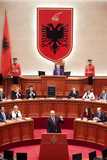Report / Albania
The eagle rebranded
Albania’s new prime minister has a daunting job on his hands. With unemployment levels at 12.8 per cent and corruption rife, the nation is ready for change – and the somewhat eccentric Edi Rama is ready to step up.
Edi Rama is taking the floor of Albania’s parliament as prime minister for the first time. His task is the formality of introducing his new government’s programme. It doesn’t go altogether smoothly. In his opening remarks Rama pledges to respect his political adversaries but observes that they haven’t always extended him the same courtesy when they were in charge. This elicits hissing, harrumphing and unparliamentary language before the opposition bloc stands, en masse, and leaves the building.
“I understand it,” Rama tells monocle later. “It was just too much for them, after years of saying bluntly that me becoming prime minister would never happen. But it’s a pity.”
Rama, 49, has not yet moved in to the prime minister’s office. Since he led the Socialist Party and its accompanying alliance to victory in June’s elections, he has operated from the party’s purple-carpeted headquarters behind Skanderbeg Square in central Tirana. When I met Rama 10 years ago, the artist and former basketballer was Tirana’s mayor and had decorated his office with the same eccentric exuberance he had brought to the job – most memorably expressed in a campaign to paint Tirana a rainbow of lurid colours.
Rama’s current digs do not disappoint. More arresting features include a model of his campaign bus, a Franz Kafka mouse mat, dozens of small sculptures, the hundreds of pens and crayons with which he doodles on diary pages during meetings – a book of these spontaneous abstracts has been published by Swiss art imprint jrp Ringier – and a pair of surprisingly lively turtles, named Fatos and Sali, after Rama’s immediate predecessors as prime minister, Fatos Nano and Sali Berisha.
“A friend of mine told me turtles would be good for my allergic asthma,” he explains. “I don’t know why. But I have felt a change. Since I was a kid, I wanted to believe in miracles.”
As mayor, Rama became famous for his apparent whimsy but his caprices were always underpinned by a deep, faintly fretful seriousness about the possibilities of government. Which of those competing instincts triumphs when you’re put in charge of the country?
“I expected to feel more joyful,” he says. “But it was too big, too burdening, and it humbled me in my soul and my body. I didn’t feel bigger; I felt smaller. For a week after the result, I felt empty, asking myself if I was really the person on whom all this should be placed.”
It’s a daunting prospect. Albania has a lower gdp per capita than Turkmenistan. Unemployment is 12.8 per cent – and nearly three times that among young people. Electricity and running water cannot be taken for granted. The corruption is proverbial. Where do you even start?
“We have to be bold,” says Rama, “or as bold as we can be with little money. We’ll move against illegal gambling and illegal weapons. There will be a national clean-up – there’s an epidemic of illegal building, especially on the seaside. And we need to address corruption. People don’t corrupt systems; systems corrupt people. So we change the systems.”
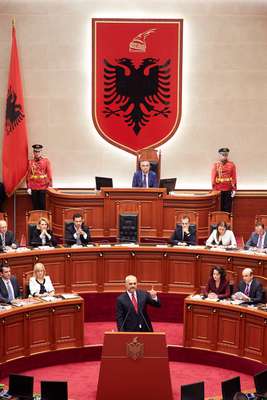
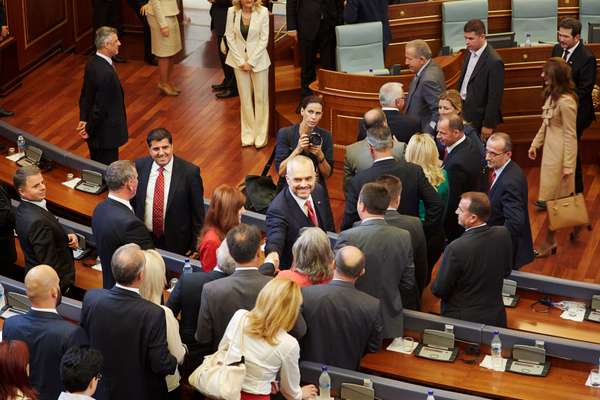
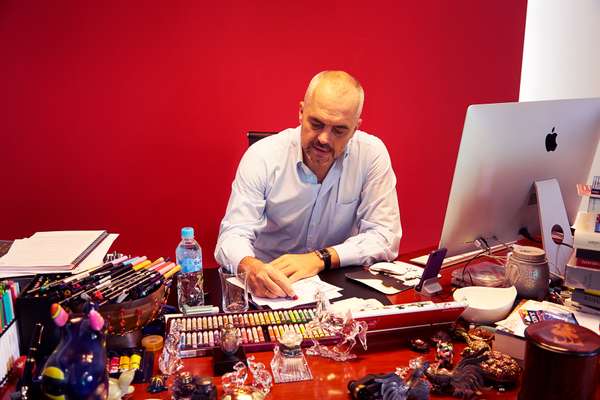
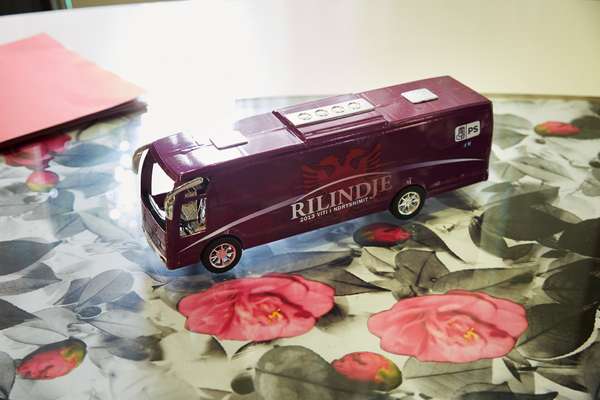
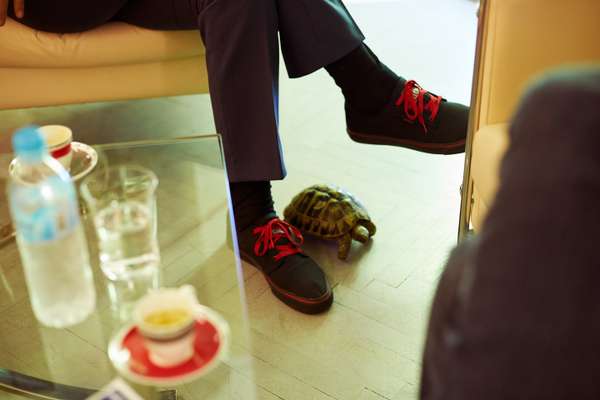
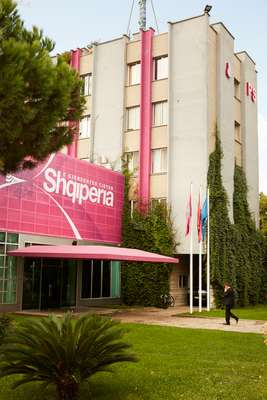
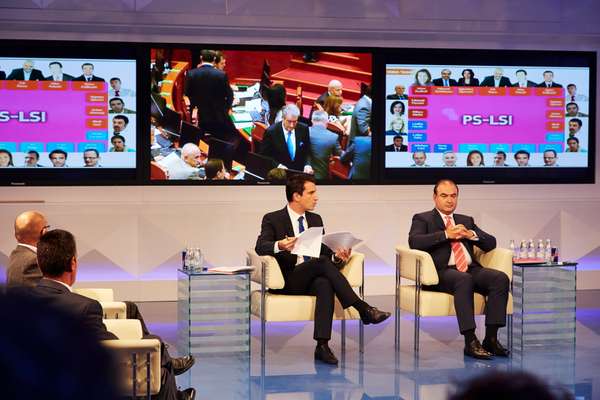
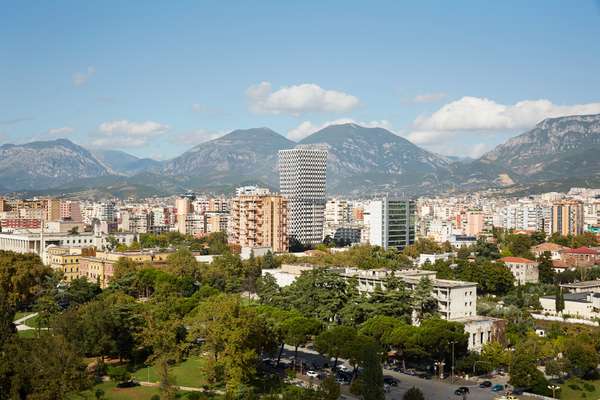
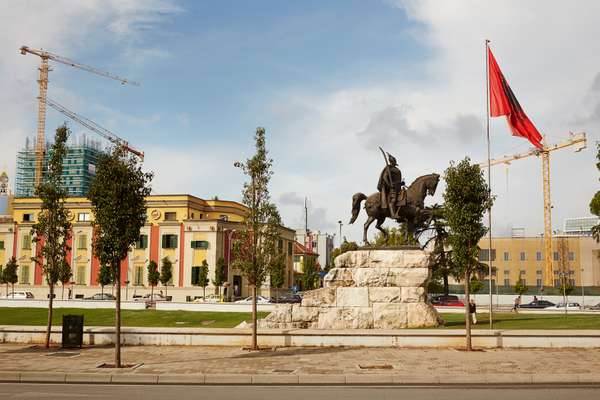
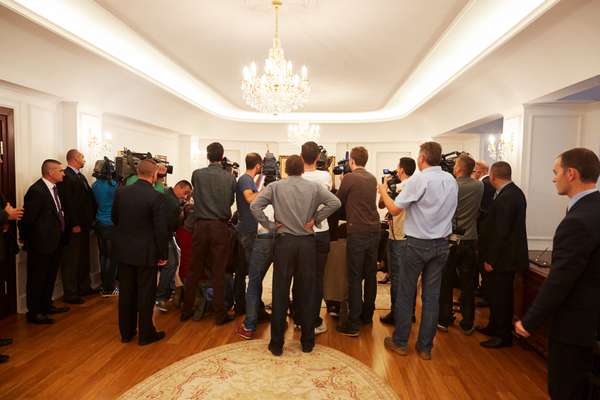
Rama and his ministers have set themselves the challenge of making a difference in their first 100 days. They have little experience of national government. Aside from Rama, who was minister of culture in the late 1990s, none has held cabinet rank before. This is by design: Rama wants a break from how things have been done in the past. His cabinet tends towards youth but they are not idealists. Like many youngish Eastern Europeans who recall life under communism, they are uninterested in dogma, and focused instead on practicalities.
It is telling that Tony Blair’s New Labour is frequently cited as an inspiration (and that Blair staffers Alastair Campbell and Jonathan Powell have been advising the new government).
What will be the very first instruction he gives as leader of his country’s government? “I’m going to take down the fences around the prime minister’s office,” he says, as Fatos – or possibly Sali – meanders around his red-laced sneakers. “They’re horrible.”
“The prime minister,” says incoming foreign minister Ditmir Bushati, “is a unique character, with an unusual career behind him. So he’s an asset in terms of rebranding but Albania is a higher hurdle than Tirana.” Bushati, who is 36, is preparing to spend the majority of his first week in the job out of the country – in Pristina, Brussels and New York.
“Albania is peculiar,” he says, “in that a third of the nation lives abroad. And those people are not involved enough in branding Albania. I know we have a bad image but there are talented Albanians in the diaspora we could be proud of, and we want to involve them. We need to go beyond classic diplomacy.”
Bushati speaks of cultivating relationships with Albanian communities just outside Albania’s borders – in Kosovo, Macedonia, Montenegro and Serbia’s Preševo Valley. He acknowledges that this has to be done without inflaming paranoia among Albania’s neighbours.
“We are very sober in that respect,” says Bushati, shaking his head emphatically. “Our future is the EU. There will be no discussion of Greater Albania. But we want to be more positive in the region.”
Bushati notes that it’s easier to fly from Tirana to Vienna than to Belgrade, Skopje, Zagreb or Sarajevo – which raises the risk of missed connections for a foreign minister who will be largely relying on scheduled flights, given the lack of official aircraft at his disposal.
“Geography,” says Bushati, “is not an option. But if France and Germany can get along, so can Albanians and Serbs. I’m aware of the realities of the Balkans. I know we produce more history than we can consume.”
For this and other reasons, Albania’s defence portfolio is a sensitive one. “Part of the army,” says the new defence minister, Mimi Kodheli, “has worked against the opposition – against the law.”
On 21 January 2011, Albanian soldiers fired on a demonstration in Tirana – one of many protests that followed the 2009 election, lost by Edi Rama’s Socialists and widely believed to have been rigged. Four people were killed. “I’ll never forget what I saw that day,” says Kodheli, 49. “I was quite close to one of the people shot dead.”
A cornerstone of functional democracy is the willingness of the military to accept civilian command. Kodheli, it seems safe to assume, will be taking charge of at least some soldiers who don’t care much for her or what she represents.
“I am wondering how the first day will go,” she says with a smile. “Some media call me the ‘Iron Lady’, which I’m not. But I’m tough. And maybe it’s not the military’s fault. The Berisha government cut people into two categories – those with them, or against them. People lost their careers for liking Edi Rama. The military served the party, not the people.”
Albania’s incoming cabinet talk about tackling corruption, and so they should – Transparency International’s Corruption Perceptions Index rates Albania alongside Ethiopia and Niger, which is a stretch from where an EU aspirant wants to be.
But defence departments in the most honest nations are prone to skullduggery, encouraged by a combination of fabulous spending and secrecy. At a lower level, Kodheli says she has heard of officers buying rank, or troops paying for postings to Afghanistan, for the extra wages.
“On my first day,” she says, “I’ll meet the commanders – aviation, marine, army. I need to present the military budget by the end of this month and I don’t know if they’ve prepared anything.”
Like all her cabinet colleagues, Kodheli has requested handover meetings with her predecessor – and, like all her cabinet colleagues, has been ignored.
Rama’s first foreign visit as prime minister is next door to Kosovo. His motorcade leaves Tirana early and weaves through the mountains of northern Albania as dawn crawls across the peaks. Over the border, saluting Kosovar policemen punctuate the highway. In Pristina, Rama is greeted by a Kosovo army band and his prime ministerial counterpart, former Kosovo Liberation Army commander Hashim Thaçi. Despite their radically different backgrounds, the painter and the guerilla get on well.
“It’s true,” says Rama. “One of us comes from war, and one from art, but we both entered politics for freedom. And in terms of political skill, he is the best adviser.”
Back in Tirana, Rama spends two long days in a marathon sitting of parliament, followed by the eventual ceremonial recognition of his new government. In the early evening, to a fanfare of Queen’s “One Vision”, his cabinet gathers on the steps of the prime minister’s office and Rama makes a brief speech to a few thousand enthusiasts. “It’s still too humbling,” he says afterwards. “And in the next 100 days we’ll see if we’re too optimistic.”
Monocle fixes
Nowhere else in Europe can you see a helmet-free motorcyclist steering with one hand while dangling a baby on the petrol tank with the other. Albania’s chronically idiotic motoring needs urgent and ruthless correcting
The colourful civic paint jobs that were a signature of Edi Rama’s mayoralty are fading. They were a terrific quirky selling point for Albania’s capital and should be touched up.
There is still nothing much being done with the dowdy villa once occupied by loopy dictator Enver Hoxha. Its prime location amid the bars and cafés of Tirana’s Blloku district would make it an ideal gallery and/or museum
On which subject, Hoxha’s deranged pyramid mausoleum has fallen into grim, graffiti-slathered disrepair. It had a certain ironic cachet back when it was repurposed as a disco and event space, but now it just needs bulldozing
Tirana needs more small, cool and competently run hotels. The exemplary Hotel Boutique Kotoni, where Monocle stayed, should be giving lessons

